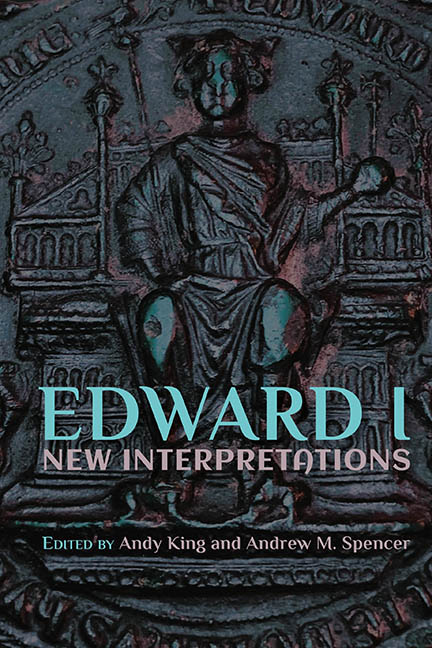Book contents
- Frontmatter
- Contents
- List of Contributors
- Acknowledgments
- Abbreviations
- Genealogy of Edward I
- Introduction
- 1 The Lord Edward and the Administration of Justice across his Apanage, 1254–72
- 2 A Tale of Two Ministers: Robert Burnell, Walter Langton and the Government of Edward I
- 3 Law and Order in the Reign of Edward I: Some New Thoughts
- 4 Magnates, Ritual and Commensality at Royal Assemblies: Bogo de Clare and Edward I’s Easter Parliament, 1285
- 5 Royal Daughters and Diplomacy at the Court of Edward I
- 6 Hearts and Bodies: Edward I and the Scottish Magnates, 1296–1307
- 7 Edward I and the Blessed Virgin Mary
- 8 Letters and Political Discourse under Edward I
- 9 Crisis? What Crisis? 1297 and the Civil War that Never Was
- Index
6 - Hearts and Bodies: Edward I and the Scottish Magnates, 1296–1307
Published online by Cambridge University Press: 21 March 2020
- Frontmatter
- Contents
- List of Contributors
- Acknowledgments
- Abbreviations
- Genealogy of Edward I
- Introduction
- 1 The Lord Edward and the Administration of Justice across his Apanage, 1254–72
- 2 A Tale of Two Ministers: Robert Burnell, Walter Langton and the Government of Edward I
- 3 Law and Order in the Reign of Edward I: Some New Thoughts
- 4 Magnates, Ritual and Commensality at Royal Assemblies: Bogo de Clare and Edward I’s Easter Parliament, 1285
- 5 Royal Daughters and Diplomacy at the Court of Edward I
- 6 Hearts and Bodies: Edward I and the Scottish Magnates, 1296–1307
- 7 Edward I and the Blessed Virgin Mary
- 8 Letters and Political Discourse under Edward I
- 9 Crisis? What Crisis? 1297 and the Civil War that Never Was
- Index
Summary
ON 24 July 1304, before the gates of Stirling Castle, the last stronghold resisting the rule of Edward I over the kingdom of Scotland was surrendered. The submission of the garrison brought to a close more than seven years of warfare between the English king and his opponents in Scotland and completed Edward's second conquest of the land. In a royal document drawn up to record the capitulation of Stirling, the terms of surrender were prefaced by an account of the wider context. This recalled ‘the presumptuous rebellion which some of the prelates, earls, barons, knights, communities and inhabitants of the kingdom of Scotland … dared to raise against the lord Edward … their lord and king’. Edward entered the kingdom for the correction of their great offences and ‘by brandishing the royal power and extending the royal arm with a strong hand … he led them to a wiser spirit’. The Scottish lords and people acknowledged Edward as their liege lord and, returning to his obedience, will and lordship, sought his pardon and the restoration of their lands.
Edward I's Scottish wars provide one of the defining elements of the king's reign. They confirm both the positive and negative views of the king. Edward is revealed as able and tenacious, a warrior king at the head of his realm, and as harsh and intransigent in his pursuit of dubious rights by force. His apparent victory over his Scottish opponents in both 1304 and in 1296 drew fulsome praise from English contemporaries. However, the king's ultimate failure to secure his authority over the northern kingdom created a poisoned legacy for his successors. Unlike Wales, where he received the name ‘conqueror’, the successes won by Edward in 1296 and 1304 did not produce lasting conquests. Instead armed opposition to the English king's sovereignty was renewed in 1297 and 1306, forcing Edward into fresh conflicts. If Edward twice demonstrated that he possessed the ability and resources to force the surrender of Scotland through warfare, this was clearly not enough. Conquest, in its fullest sense, was a political not a military act. War was the tool but the key was recognition of the obedience owed to the conqueror.
- Type
- Chapter
- Information
- Edward I: New Interpretations , pp. 105 - 124Publisher: Boydell & BrewerPrint publication year: 2020



